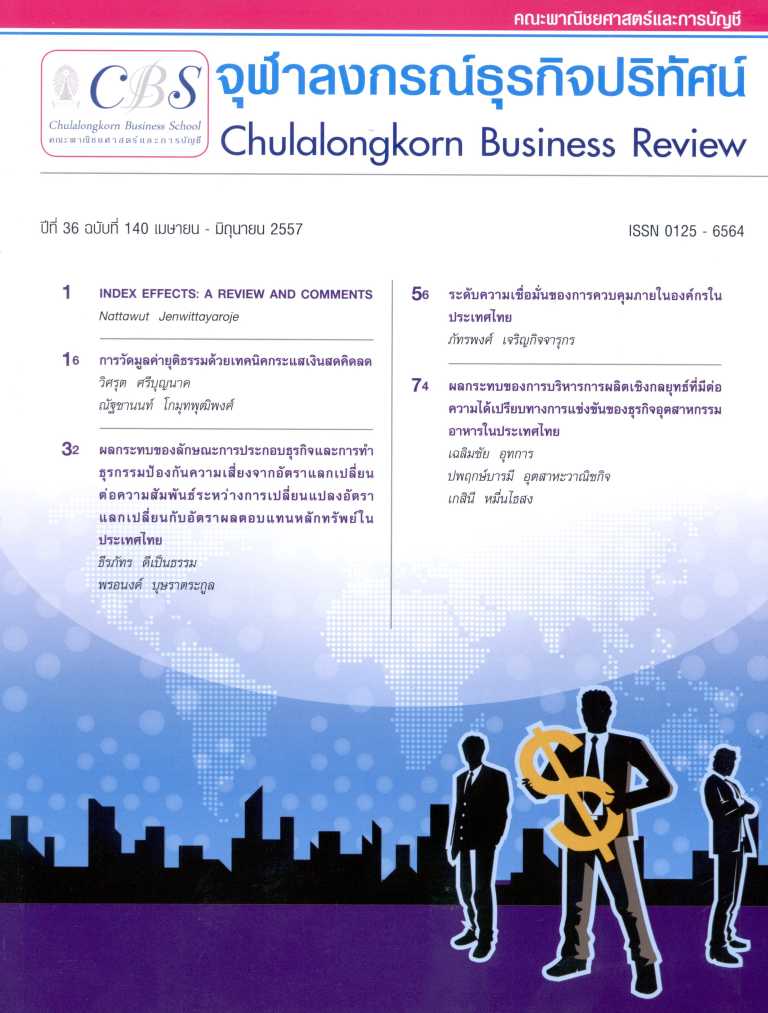ผลกระทบของลักษณะการประกอบธุรกิจและการทำธุรกรรมป้องกันความเสี่ยงจากอัตราแลกเปลี่ยนต่อความสัมพันธ์ระหว่างการเปลี่ยนแปลงอัตราแลกเปลี่ยนกับอัตราผลตอบแทนหลักทรัพย์ในประเทศไทย
Main Article Content
Abstract
บทคัดย่อ
งานวิจัยนี้ศึกษาความสัมพันธ์ระหว่างการเปลี่ยนแปลงอัตราแลกเปลี่ยนกับอัตราผลตอบแทนของหลักทรัพย์ในตลาดหลักทรัพย์แห่งประเทศไทยและศึกษาปัจจัยที่มีผลกระทบต่อความสัมพันธ์ดังกล่าว โดยใช้สมการถดถอยในการศึกษา การวิจัยนี้ใช้อัตราแลกเปลี่ยน 2 ประเภท คือ ดัชนีค่าเงินบาทที่แท้จริงและอัตราแลกเปลี่ยนระหว่างเงินบาทและเงินดอลลาร์สหรัฐ ข้อมูลที่ใช้ในการวิจัยคือราคาปิดรายเดือนของอัตราผลตอบแทนของตลาดหลักทรัพย์แห่งประเทศไทยและอัตราผลตอบแทนของบริษัทที่จดทะเบียนทั้งสิ้น 244 บริษัท ในช่วงเดือนมกราคม พ.ศ. 2546 ถึงเดือนธันวาคม พ.ศ. 2554 ผลการวิจัยพบว่าความสัมพันธ์ระหว่างการเปลี่ยนแปลงอัตราแลกเปลี่ยนที่พ้องกับการเปลี่ยนแปลงอัตราผลตอบแทนของตลาดหลักทรัพย์มีนัยสำคัญทั้งกรณีที่อัตราแลกเปลี่ยนเป็นดัชนีค่าเงินบาทและอัตราแลกเปลี่ยนระหว่างเงินบาทและเงินดอลลาร์สหรัฐ ส่วนความสัมพันธ์ระหว่างการเปลี่ยนแปลงอัตราแลกเปลี่ยนที่ตามหลังการเปลี่ยนแปลงอัตราผลตอบแทนหลักทรัพย์มีความสัมพันธ์อย่างมีนัยสำคัญเมื่ออัตราแลกเปลี่ยนเป็นการเปลี่ยนแปลงระหว่างเงินบาทและเงินดอลลาร์สหรัฐเท่านั้น ส่วนในระดับบริษัทพบว่ามีทั้งบริษัทที่ได้ผลกระทบจากการเปลี่ยนแปลงของดัชนีค่าเงินบาทและการเปลี่ยนแปลงระหว่างเงินบาทและเงินดอลลาร์ทั้งในกรณีที่อัตราแลกเปลี่ยนเปลี่ยนแปลงพ้องและตามหลังการเปลี่ยนแปลงอัตราผลตอบแทนของบริษัท สำหรับปัจจัยที่มีผลกระทบต่อความเสี่ยงจากอัตราแลกเปลี่ยนพบว่า ในกรณีที่อัตราแลกเปลี่ยนเป็นดัชนีค่าเงินบาท มูลค่าตลาดเป็นปัจจัยที่มีผลอย่างมีนัยสำคัญต่อความเสี่ยงจากอัตราแลกเปลี่ยนแต่ไม่มีผลเมื่ออัตราแลกเปลี่ยนเป็นอัตราแลกเปลี่ยนระหว่างเงินบาทและเงินดอลลาร์สหรัฐ ส่วนลักษณะการประกอบธุรกิจและการทำธุรกรรมป้องกันความเสี่ยงจากอัตราแลกเปลี่ยนไม่มีผลต่อความเสี่ยงจากอัตราแลกเปลี่ยนอย่างมีนัยสำคัญทางสถิติ
คำสำคัญ: อัตราแลกเปลี่ยน ตลาดหลักทรัพย์ ธุรกรรมป้องกันความเสี่ยง การประกอบธุรกิจ
This research aims to examine the relationship between changes in exchange rate and stock returns in Thailand and also examine factors that affect this relationship. This research applies regression to examine the study. The Real effective exchange rate (REER) and USD-BAHT exchange rate are used as a proxy for exchange rate series. The closing prices of the Stock Exchange of Thailand (SET) and 244 listed companies are also used in this research. All data are covered the period from January, 2003 to December, 2011. The results indicate that there is a significant relation between contemporaneous stock returns and both REER and USD-BAHT exchange rate. While, lagged-exchange rate, there is a significant relation only on USD-BAHT. Moreover, the returns of firms that listed in SET are also significantly exposed to exchange-rate fluctuations. When we use REER as the dependent variable, market value is only one factor that affects exchange rate exposure, but this factor does not affect on USD-BATH exchange rate. However, the relationship between changes in exchange rate and stock returns is not influenced by foreign operation and the use of currency hedging transactions.
Keywords: Exchange Rate, Stock Market, Hedging Transactions, Foreign Operations.Article Details
Opinions and discussions in papers published by the Creative Business and Sustainability Journal (CBSJ) are deemed as personal opinions and the responsibility of the writers. They are not the opinions or responsibility of the Chulalongkorn Business School of Chulalongkorn University.
Papers, content, information etc. appearing in the Journal are deemed to be the copyright property of the Chulalongkorn Business School of Chulalongkorn University. Anybody or any organization that wishes to publish any part of them or use them in any way must obtain written permission from the Chulalongkorn Business School, Chulalongkorn University.


